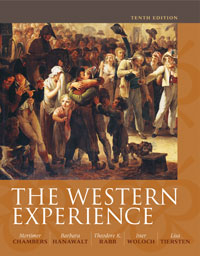| A) | The belief that the amount of wealth in the world was fixed, and that a nation should try to gain as much as it could at the expense of other nations, either by accumulating more gold or, in a more sophisticated version, by improving its balance of trade— that is, by exporting more than it imported. This doctrine led to some governmental regulation of commerce in a number of countries in the seventeenth and eighteenth centuries.
|
| B) | A feudal system of agricultural exploitation in which peasants were bound to their lord's estate and owed him forced labor.
|
| C) | The division of agricultural land on a manor into three large fields. The lord held land for his direct profit in these, and his serfs also had strips of land in all three fields. The land farmed by each individual was therefore mixed in with, and open to, neighboring plots. The medieval system lasted long after serfdom ended in England and France.
|
| D) | The act of consolidating and fencing in land used in open-field agriculture or village common land.
|
| E) | Peace treaty ending the British and French war for empire in which France surrendered Canada to the British and lost its foothold in India.
|
| F) | The theory in which individual self-interest and free markets, rather than state regulation or guild protection, stimulate economic progress.
|
| G) | A complex pattern of colonial commerce between the home country (Britain or France) and its colonies in which refined or manufactured goods were exchanged for raw materials or slaves from West Africa.
|
| H) | Heavy concentrations of prefactory manufacturing, in which urban merchants employed rural households to produce goods, especially textiles.
|
| I) | The harsh voyage of slaving ships from Africa to the Americas during which an average of 10 percent of the slaves perished.
|
| J) | A system prevalent in Western Europe by which peasants owed various fees and dues to the local lord even if the peasants owned their land.
|
| K) | A corporation that initially traded with native groups in India but eventually exercised an oppressive colonial dominance over Indian affairs.
|





